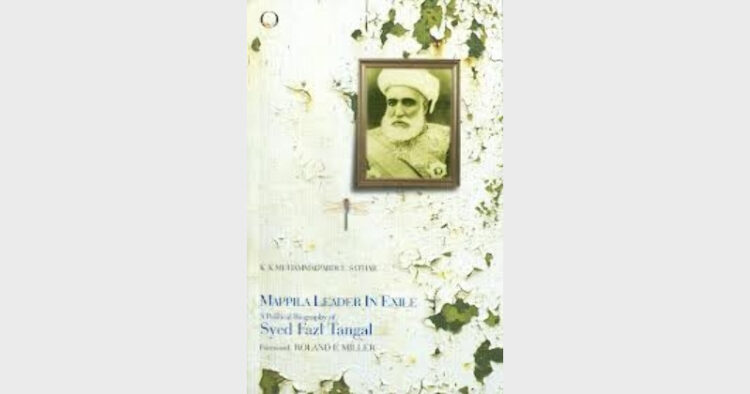Nidhi Mathur
Mappila Leader in Exile: A Political Biography of Syed Fazl Pookoya Tangal, K.K. Muhammed Abdul
Sathar, Other Books, Pp 207, Rs 340.00
SYED Fazl Tangal is well known in Kerala for his role in the Mappila struggle which earned him fame for his religious role as well as social, against the British colonial power.
This volume presents a study of the interplay of religion and politics where the political outlook and disposition of Mamburan Syed Fazl Tangal (1824-1900) took its roots among the Ba Alawis in Yemen before taking him to the Malabar of the 19th century. Syed Fazl Tangal emerged as a religious scholar, reformer and spiritual guide, with all the roles buttressing his political stance against the British and their yes men, who were the landlords of the erstwhile Malabar. Syed played a pivotal role in enhancing the spirit of revolution among the Mappilas, so much so that the British had to deport him to Arabia. He went to Turkey and served as a plenipotentiary of the Ottoman Caliphate. During the struggle for India’s Independence, he turned out to be a leader in exile, inspiring national leaders like Muhammed Abdul Rehman Sahib from afar.
‘The book talks about the tradition of resistance and mysticism in Hadhramawt of Yemen, which went to the making of Syed Fazl’s dissident political and religious career. Syed Fazl belonged to this Ba Alawi clan of Yemen from where he came to Malabar presumably in the 18th century, heralding a change in the anti-colonial resistance in the region against British rule. Syed Shaikh Jifri, the first among the Ba Alawi saints, settled in Calicut, where the Zamorin extended a warm welcome to him. Malabar with a huge gap between the landed and the landless and rulers and the ruled, had become a feudal society with the yoke of colonial rule still burdening its fragile structure.
Syed Fazl’s father, Syed Alawi Tangal, whose role in the region was as significant as that of his son. Syed Alawi issued a fatwa, saying an emphatic no to the practice among the lower-class converts of addressing the upper caste jenmis with the honorific ‘you’ and of eating the food left over by the latter. It all began when a convert maidservant took to addressing her superiors with their proper names and not ‘you’. She was humiliated and the incident led to the Cherur revolt against casteism and untouchability. At this time Syed Alawi built a number of mosques in Malabar and converted many to the path of Islam.
It details the life and milieu of his son, Syed Fazl, who was a model of piety and virtues and devoted his time in pursuit of knowledge. He erected a mosque at Mamburam and from there he gave sermons, attacking the existing social order in which the powerful Nair landlords enjoyed high esteem. Later he came to rule in Hejaz and Zufar in the name of the Ottoman Sultan during the 1870s. He tried to link the anti-British agitation of Malabar Mappilas with pan-Islamic activities in Istanbul. His dictates on strict observance of Islamic practice alongside the struggle against colonialism proved the pan-Islamic nature of his revolt against the British.
It highlights his role in the anti-colonial struggle and uprisings with which his name came to be associated. The chapter describes the nature of the Mappila uprisings and how the British, unsure of Syed Fazl’s role in them, decided to deport him.
The fifth chapter describes the attempts made by the colonial authorities to deport and thereby silence Syed Fazl. The report by British collector, H.V. Connolly, recommending his deportation before the submission of the report itself to Arabia on 19 March 1852, his posting as a plenipotentiary with the Ottoman Sultan and his death in Istanbul in October 1900 – all these are narrated in this chapter.
The sixth chapter describes the attempts made by Indian national leaders, like Muhammed Abdul Rehman Sahib to bring the legacy of Hadhrami Syeds back to Malabar.
(Other Books, 1st floor, New way Building, Railway Link Road, Calicut – 673 002 Kerala; www.otherbooksonline.com)














Comments